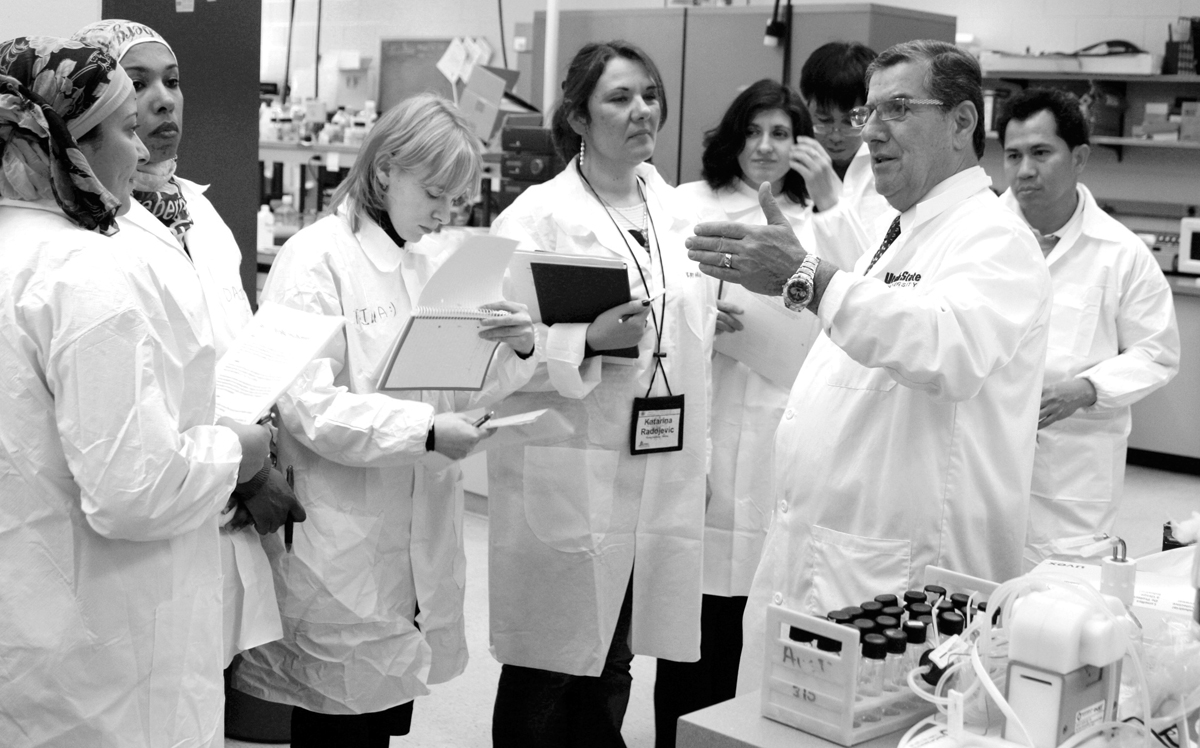Visiting doctors examine USU’s vaccination ideas
Utah State University’s Center for Integrated Biosystems (CIB) is currently hosting 16 scientists from seven countries for training in advanced vaccine production techniques.
CIB associate director Kamal Rashid and Bart Tarbet, research assistant professor with the Institute for Antiviral Research, are working with the scientists, providing instruction in a lecture setting as well as in the laboratory. The training started on Monday and will extend through March 11.
The three-week training course is being funded through a grant from the Biomedical Advanced Research and Development Authority (BARDA) of the U.S. Department of Health and Human Services. The grant for this year’s training totals around $322,000, and funding to continue the program in subsequent years is anticipated to reach as much as $2.6 million.
USU is one of the two universities in the nation to receive grants from BARDA to train scientists from developing countries. The scientists participating in the course, officially known as the USU/BARDA Influenza Vaccine Biomanufacturing Training Course, come from Egypt, Romania, Russia, Thailand, Vietnam, Serbia and Korea and are involved in vaccine production in their home countries.
“We have been offering biomanufacturing training courses at this center for the past 10 or 11 years,” Rashid said. Rashid said USU has one of very few facilities in the nation to provide such training.
Rashid said he hopes the program will be a two-way educational experience. Speaking to the scientists in an orientation meeting Sunday morning, Rashid said, “During these three weeks, you will be an experiment for us and we will be an experiment for you. Hopefully we will learn some hints from you on how to do things better, and hopefully you learn something from your long trip here.”
The training program is part of the World Health Organization’s (WHO) recent efforts to prepare countries to deal with pandemic influenza outbreaks, such as the H1N1 virus in 2009. The H1N1 virus, often referred to as swine flu, is estimated by the Center for Disease Control to have killed between 8,000-17,000 Americans.
“Vaccination could prevent much of the illness, and many unnecessary deaths, if it were only more readily available. This training course will help visiting scientists increase their ability to produce the vaccines necessary to combat future influenza epidemics and pandemics,” Tarbet said in a press release earlier this week.
Much of the three-week program will be focused on cell-based influenza vaccine production, a new way to make flu shots. Cell-based production has many advantages over the most common method, which uses chicken eggs to produce the vaccine, but switching to the new method can be a lengthy and costly process. Rashid said he hopes participants in the program can start using cell-based manufacture in their home countries within the next decade.
Daniel Chirita, a research scientist from the Romanian National Institute for Research and Development in Microbiology and Immunology, said he was looking forward to learning from the experienced USU researchers. When asked what he hoped would be part of the training, Chirita said, “cell culture scale-up, mainly. I hope to learn to scale up cells from the flask.”
Since cell-based production can make larger amounts of vaccine in a shorter amount of time, training scientists in the technique will help governments and organizations worldwide prepare for future influenza outbreaks.
“If we want to have tons of vaccine doses, we must move to animal cell-based (production), because with the egg-based right now, if you want to make 300 million for the U.S. population, it takes 900 million eggs,” Rashid said.
Three of the visiting scientists come from Egypt, a country covered often in recent news due to an 18-day protest that ended the 30-year rule of President Hosni Mubarak earlier this month. The three arrived in America from Cairo on Saturday, and said they felt very at home in Logan and are hopeful that the training will help them in their work in their country.
“It is different from what we are working, because we are working industrially, not in a laboratory, but I think that the main concept will be the same,” said Dalia Mohamed Sayed Ahmed, BCG production manager at the Egyptian Holding Company for Biological Products and Vaccines.
– steve.kent@aggiemail.usu.edu

